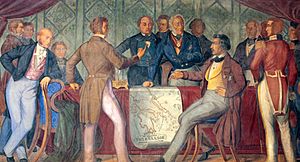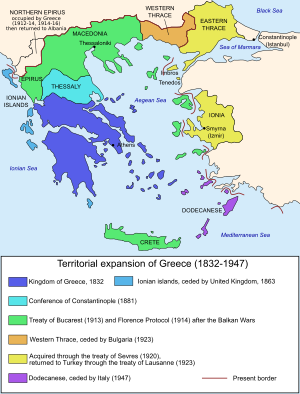London Protocol (1830) facts for kids
 |
|
| Context | The first official international diplomatic act that recognized Greece as a sovereign and independent state. |
|---|---|
| Signed | February 3, 1830 |
| Location | London, United Kingdom |
| Parties | |
The London Protocol of 1830, also known as the Protocol of Independence, was an important agreement signed by France, Russia, and Great Britain on February 3, 1830. This was the very first official international agreement that recognized Greece as a completely independent country.
This protocol gave Greece all the political, administrative, and business rights of an independent nation. It also set the northern border of Greece, running from the Achelous river to the Spercheios river. Greece had already been recognized as having some self-rule since 1826. A temporary Greek government, led by Governor Ioannis Kapodistrias, was already in place. However, the exact conditions of Greece's self-rule, its political status, and its final borders were still being discussed by the major European powers, the Greeks, and the Ottoman government.
The London Protocol decided that Greece would be a monarchy, meaning it would be ruled by a king or queen. The countries that signed the protocol first chose Prince Leopold of Saxe-Coburg and Gotha to be the monarch. But Leopold turned down the offer. So, at another meeting in London in 1832, they chose 17-year-old Prince Otto of Bavaria to be the King of Greece. The new country was then officially called the Kingdom of Greece.
Contents
How Greece Became Independent
The Greek War of Independence started in 1821. By January 1822, the temporary Greek government had set up an assembly and a formal constitution. By 1823, the British Foreign Secretary, George Canning, became very interested in the "Greek issue." He wanted Greece to be recognized internationally. This would help stop Russia from expanding its influence into the Aegean Sea.
- January 1824: Russia suggested a plan to create three small Greek states, similar to other regions. This plan did not satisfy the Greeks, who were fighting for full independence.
- June 1825: Under pressure from battles in the Peloponnese, the Greek government asked the British government to choose a king for Greece. They preferred Leopold of Saxe-Coburg and Gotha. This act was like asking Greece to become a British protectorate. However, Canning refused to accept this request.
- April 1826: The Protocol of St. Petersburg was signed by Britain and Russia. This was the first official document that recognized Greece's political existence and gave the Greeks self-rule.
The agreements from the St. Petersburg protocol were repeated in the Treaty of London in July 1827. This treaty aimed to stop the fighting in Greece. It suggested that Greece become a dependent state of the Ottoman Empire and pay a yearly tax. A secret part of the treaty also allowed for military action to force both sides to accept the terms. This eventually led to the Battle of Navarino on October 20, 1827. In this battle, the Turkish fleet was defeated by the three Great Powers (Great Britain, France, and Russia). This victory gave hope to the Greeks, even though the European powers were still only talking about self-rule, not full independence.
Changing British Plans and Setting Borders
From 1827 to 1828, there were many changes in the British government. George Canning became Prime Minister in April 1827 but sadly died in August. Other leaders followed quickly.
- September 1828: Ioannis Kapodistrias, the Governor of Greece, sent a secret message to the three powers. He protested against the small borders he expected for the new Greek state. He did not yet bring up the issue of full independence.
- November 1828: The British Foreign Secretary, Lord Aberdeen, suggested the first London protocol. This agreement had unfavorable terms for Greece, granting only the Peloponnese and the Cyclades islands to Greece. This made Kapodistrias very upset.
- March 1829: Kapodistrias used disagreements among the three Powers to push for new talks. This led to the second London protocol on March 22, 1829. This protocol suggested:
- A border from the Ambracian Gulf to the Pagasetic Gulf, including the islands of Euboea and the Cyclades.
- The Ottoman Empire would still have some authority over Greece, and Greece would pay a yearly tax to the Sultan.
- Greece would have a Christian ruler who would inherit the throne. This ruler could not be from the royal families of the three Powers. He would be chosen with the agreement of the three Courts and the Ottoman Empire.
War Between Russia and Turkey
The Ninth Russo-Turkish War ended in 1829 with Turkey's defeat. Russia forced Turkey to sign the Treaty of Adrianople on September 14, 1829. This treaty gave Russia more control over some areas and put Russian traders in Turkey under the Russian Ambassador's authority.
Britain's New Plan: Full Independence
After Russia won the war, it wanted to help Greece become a fully independent nation. Russia forced the Sultan to agree to give Greece self-rule and accept trade terms that favored Russia. Britain, also involved in helping Greece, had its own goals. Britain wanted to create an independent Greek state that would limit Russia's influence in the Aegean Sea. At the same time, Britain wanted to keep the Greek borders small, especially in Western Greece. This was to ensure a safe distance from the Ionian Islands, which were then under British control.
The Greek government asked the Powers to change the northern border to include Mount Ossa, but they refused. So, new negotiations began. These talks led to the Protocol of Independence, or the London Protocol of 1830, signed on February 3, 1830.
Who Was Involved?
Representatives from England, France, and Russia (Aberdeen, Montmorency-Laval, Leuven) took part in the London talks and signed the protocol. However, representatives from Greece and Turkey were not present. All three European countries wanted to increase their own influence in the new Greek state while limiting the influence of their rivals.
Ioannis Kapodistrias, the Governor of Greece, was not included in the talks. This was because the British suspected he was encouraging a revolution in the Ionian Islands. In response, Kapodistrias warned that he would not accept terms that were bad for Greece. He insisted on his country's right to speak at the conference. The Sultan of the Ottoman Empire had agreed to sign whatever was decided at the London conference, just to end the war.
Signing the Protocol
The 11 articles of the protocol recognized an independent Greek state. Its border was set along the Aspropotamos–Spercheios line. Initially, Euboea, the Cyclades, and the Sporades islands were included in Greece. However, Crete and Samos were not. In a second agreement signed on the same day, Leopold was chosen as the "Ruler Sovereign of Greece." He was also granted a loan to support the army he would bring with him.
The Great Powers demanded that Greece protect the lives and property of Muslims living in Greek territory. They also asked Greek troops to leave areas outside the new borders. With the protocol of February 3, the war officially ended. The Greek state was formally recognized by other countries. This recognition by the three powers and Turkey was a very important moment in modern Greek history. However, these decisions were not final regarding either the borders or the ruler. These details were settled later with international agreements in 1832.
Kapodistrias's Efforts to Improve Borders
On April 8, 1830, ambassadors from Russia, Britain, and France informed Greece and the Ottoman Empire about the protocol. The Sultan accepted Greece's independence. Ioannis Kapodistrias, who had been the Foreign Minister of Russia and was now Greece's first governor, agreed to the terms. But he had a condition: Turks must leave the islands of Attica and Euboea. He also asked for help with the many Greek refugees expected to come from outside the new borders.
Kapodistrias also told Leopold, who was chosen as king of Greece, about his demands. He asked Leopold to join the Eastern Orthodoxy church, give political rights to the Greeks, and work to expand the borders. He wanted to include Acarnania, Crete, Samos, and Psara.
When Leopold asked the British government for money to help Greece's finances, he was refused. Seeing the huge challenges ahead, he resigned. Leopold said he did not want to force unfair decisions from foreigners onto the Greek people. He also resigned for personal reasons.

Inside Greece, opposition politicians were somewhat happy with the protocol's terms. However, they blamed Kapodistrias for not getting a border solution that truly suited Greece, instead of Britain and Russia. As governor, Kapodistrias tried to create a strong central government for Greece. He also organized tax systems, fixed the justice system, and started a quarantine system to fight diseases. Despite his efforts, his government became less and less popular.
What Happened After the Protocol
Leopold's resignation and Kapodistrias's decision to delay things led to a new conference in July 1831. This meeting proposed extending the border to the Ambracian Gulf - Pagasetic Gulf line. Turkey was forced to accept these terms, and a new protocol was signed on September 26, 1831. However, just days later, on October 9, 1831, Kapodistrias was assassinated. He was killed by Konstantis and Georgios Mavromichalis after Kapodistrias had ordered the imprisonment of their relative, senator Petrobey Mavromichalis.
After Kapodistrias's death, Russia, Britain, and France met again at the London conference. They confirmed in the Treaty of Constantinople that Prince Otto of Bavaria would become the King of Greece. This treaty finally gave Greece full independence and the larger Pagasetic Gulf - Ambracian Gulf border. Prince Otto, now crowned king, arrived in Greece with a group of advisors in 1833.
See also
- Final treaty declaring the independence of Greece (in Greek)
 | James Van Der Zee |
 | Alma Thomas |
 | Ellis Wilson |
 | Margaret Taylor-Burroughs |

